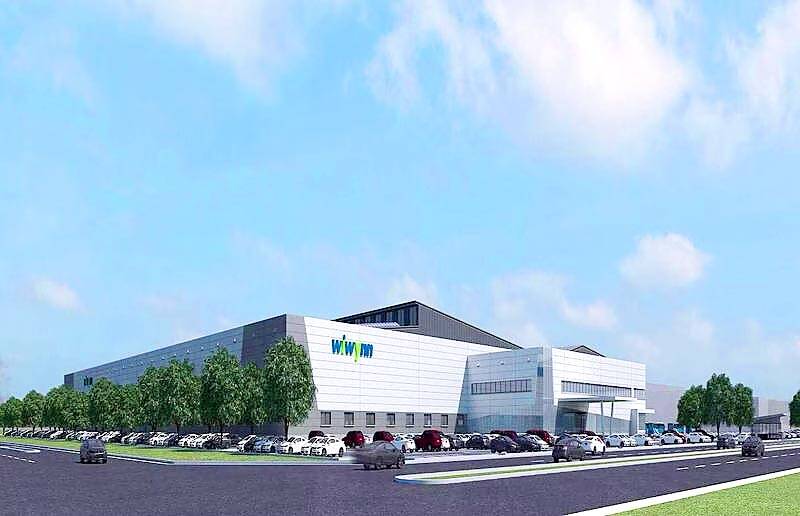Cloud computing equipment supplier Wiwynn Corp (緯穎科技) yesterday said it still plans to expand total production capacity by 50 percent from this year to 2024, even as businesses are becoming conservative on capital spending amid an economic downturn.
Wiwynn, a subsidiary of contract electronics maker Wistron Corp (緯創), provides hyperscale datacenter infrastructure products, including servers, storage and switches.
The company, based in New Taipei City’s Sijhih District (汐止), said that plans to expand capacity in Taiwan, Malaysia and Mexico remain on track, and it would continue to reduce the proportion of its assembly business in China in light of Beijing’s “zero COVID-19” policy and amid rising trade tensions between China and the US.

Photo courtesy of Wiwynn Corp
Wiwynn told an online investors’ conference that construction of a server printed circuit board assembly plant for cloud data centers in Johor, Malaysia, is expected to be finished next year, while motherboard assembly operations would start the following year.
The Malaysian plant is to be one of Wiwynn’s production hubs, providing complete services for Asia, including Malaysia, India, Australia and Northeast Asia, it said.
In Taiwan, the company is expanding motherboard production lines in Tainan and building a new system assembly plant in Kaohsiung, both of which are expected to be finished next year, it said.
“As the cloud-services trend is still on the rise from a long-term perspective, Wiwynn’s plans to expand production capacity have not changed,” the Chinese-language news site MoneyDJ.com quoted chief financial officer Harry Chen (陳昌偉) as saying yesterday.
“With cloud demand continuing, it is no longer enough to work overtime to meet customer needs. The company still needs to expand production and prepare more production capacity in response to long-term needs,” Chen said.
Microsoft Corp, Meta Platforms Inc and Amazon.com Inc are among the company’s major customers, it said.
Wiwynn on Tuesday posted a record net profit of NT$4.32 billion (US$134.29 million) last quarter, up 21.1 percent from the previous quarter and soaring 112.9 percent from a year earlier, the company said in a regulatory filing.
That translated into earnings per share of NT$24.68, up from NT$20.38 the previous quarter and NT$11.59 a year earlier.
Revenue rose 6.2 percent quarterly and 76 percent year-on-year to a record high NT$79.67 billion during the quarter, with gross margin of 8.1 percent and operating margin of 6.1 percent.
In the first three quarters, net profit totaled NT$10.22 billion, up 69.4 percent from NT$6.03 billion a year earlier, with earnings per share rising from NT$34.51 to NT$58.48, while revenue rose 51.3 percent to NT$205.44 billion. Gross margin was flat at 8.1 percent, while operating margin edged up 0.1 percentage points to 6 percent.

MARKET LEADERSHIP: Investors are flocking to Nvidia, drawn by the company’s long-term fundamntals, dominant position in the AI sector, and pricing and margin power Two years after Nvidia Corp made history by becoming the first chipmaker to achieve a US$1 trillion market capitalization, an even more remarkable milestone is within its grasp: becoming the first company to reach US$4 trillion. After the emergence of China’s DeepSeek (深度求索) sent the stock plunging earlier this year and stoked concerns that outlays on artificial intelligence (AI) infrastructure were set to slow, Nvidia shares have rallied back to a record. The company’s biggest customers remain full steam ahead on spending, much of which is flowing to its computing systems. Microsoft Corp, Meta Platforms Inc, Amazon.com Inc and Alphabet Inc are

Luxury fashion powerhouse Prada SpA has acknowledged the ancient Indian roots of its new sandal design after the debut of the open-toe footwear sparked a furor among Indian artisans and politicians thousands of miles from the catwalk in Italy. Images from Prada’s fashion show in Milan last weekend showed models wearing leather sandals with a braided design that resembled handmade Kolhapuri slippers with designs dating back to the 12th century. A wave of criticism in the media and from lawmakers followed over the Italian brand’s lack of public acknowledgement of the Indian sandal design, which is named after a city in the

The US overtaking China as Taiwan’s top export destination could boost industrial development and wage growth, given the US is a high-income economy, an economist said yesterday. However, Taiwan still needs to diversify its export markets due to the unpredictability of US President Donald Trump’s administration, said Chiou Jiunn-rong (邱俊榮), an economics professor at National Central University. Taiwan’s exports soared to a record US$51.74 billion last month, driven by strong demand for artificial intelligence (AI) products and continued orders, with information and communication technology (ICT) and audio/video products leading all sectors. The US reclaimed its position as Taiwan’s top export market, accounting for

INVESTOR RESILIENCE? An analyst said that despite near-term pressures, foreign investors tend to view NT dollar strength as a positive signal for valuation multiples Morgan Stanley has flagged a potential 10 percent revenue decline for Taiwan’s tech hardware sector this year, as a sharp appreciation of the New Taiwan dollar begins to dent the earnings power of major exporters. In what appears to be the first such warning from a major foreign brokerage, the US investment bank said the currency’s strength — fueled by foreign capital inflows and expectations of US interest rate cuts — is compressing profit margins for manufacturers with heavy exposure to US dollar-denominated revenues. The local currency has surged about 10 percent against the greenback over the past quarter and yesterday breached